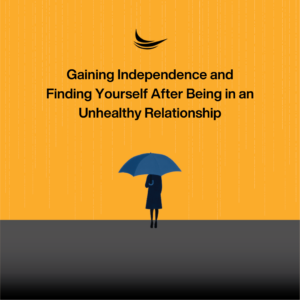Gaining Independence and Finding Yourself After Being in an Unhealthy Relationship
 There are many reasons why people stay in unhealthy relationships. Fear of being alone and low self-worth are common reasons. Starting over can feel overwhelming, especially when you have already devoted so much time and energy to the relationship. Often, people define their value and self-worth based on “success” in their roles at work, school, and/or relationships and “stick it out” in the hopes that something will change.
There are many reasons why people stay in unhealthy relationships. Fear of being alone and low self-worth are common reasons. Starting over can feel overwhelming, especially when you have already devoted so much time and energy to the relationship. Often, people define their value and self-worth based on “success” in their roles at work, school, and/or relationships and “stick it out” in the hopes that something will change.
It can be hard to adjust to a new norm after relationships end. It can also be tough to cope with the thoughts and feelings that come up after no longer being in a relationship you didn’t think would ever end. It takes a lot of courage to speak up to break the silence.
Perhaps you were in a codependent relationship. It can be hard to remember who you are when enmeshed with a partner you were trying to “save” by attending to their needs, especially at the expense of your own. It can be harder to recognize the signs of an unhealthy relationship when tolerating a partner’s abusive behavior. Taking on too much responsibility while often enabling your partner as well as taking on blame is often seen in codependency. Taking a step back as you separate from codependency gives a different perspective.
Perhaps you have left an abusive or toxic relationship. Even if some of the more obvious red flags of abuse were not present, the more subtle signs of a toxic relationship such as the feeling of constantly “walking on eggshells” with your partner, feeling consistently stressed, anxious, and depressed are often still present, even after the relationship ends.
There is important work to be done after ending an unhealthy relationship. Seeking support from a mental health specialist can help support you in this journey.
Here are some tools from the survivor support toolkit for gaining independence and finding yourself.
Ask for Help:
Consider reaching out to a therapist as a first step. At CARE Counseling we have a team of therapists with same-week availability to help you on your journey of independence.
Find Strength:
Acknowledge your inner beauty and strength. You are worthy of love and have the strength and resilience to keep going.
Define Values:
Take time to connect with yourself and identify your core values. This is an important step towards making decisions that align with your values and help you live a life that is true to yourself.
Have Patience:
Remember to be kind and gentle to yourself. Things take time, especially when healing from a painful past.
Begin Transformation:
The transformation process takes time as well as the therapy process. You may need to take things day-by-day and work on stabilizing stressors/ crises before processing the past and future planning. The benefits of all your hard work will be worthwhile!
Discover Your Passions:
Now is a wonderful time to discover or reconnect with your passions. Exploring your interests and passions in childhood can offer some insight into things that you may want to reconnect with in your adult years. It is also fun to discover new passions.
Written By: Charlotte Johnson, MA, LPCC



























